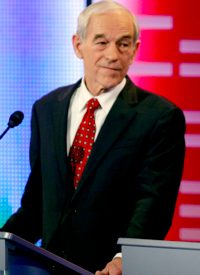
"I have learned that you should never give up on your opposition," Paul told moderators George Stephanopoulos and Diane Sawyer. "Because if you're persistent and you present your case, they will come your way."
What prompted the remarks were compliments from Texas Governor Rick Perry, former Massachusetts Governor Mitt Romney and former House Speaker Newt Gingrich. Each of the candidates were prompted by Sawyer to describe one thing they had learned from their opponents on the stage. Rick Perry said:
Congressman Paul got me really intrigued with the whole, with the Federal Reserve, and I spent a substantial amount of time reading about a book called Currency Wars, the book by James Rickards. Congressman Paul is the individual on this stage that got me most interested in a subject that I found to be quite interesting and I found at the root of a lot of the problems that we have. And I thank you for that.
Mitt Romney said he had learned about Ron Paul's leadership and ability to inspire people. "One of the things about Ron Paul that always amazes me is when I come to a debate like this," Romney said, "the only signs I'd see are the Ron Paul people. In freezing temperatures, they are always there. He ignites an enthusiasm with a number of people. It's very exciting to watch."
Earlier in the debate, former House Speaker Newt Gingrich complimented Paul's position on the Federal Reserve and Bernanke, even though the Paul campaign released an advertisement criticizing Gingrich of "serial hypocrisy." In comments meant to deflect Rep. Paul's criticism of Gingrich's $1.6 million in consulting ties to mortgage giant Freddie Mac, Gingrich offered that "I happen to be with you on auditing the Fed, and frankly, on firing Bernanke." Gingrich had said on television back in October that Paul had been "pioneering" discussion of the Federal Reserve for the past 30 years.
Paul concluded in the debate that "I have learned that you should never give up on your opposition. Because if you're persistent and you present your case, they will come your way. So Rick, I appreciate it."
Paul stressed that if federal politicians follow through with their oath of office to keep to the enumerated powers of the U.S. Constitution, there wouldn't be any reason for political infighting. "I work on the assumption that freedom brings people together," Paul added. "We shouldn't be fighting in Washington if we all take the same oath of office. Where does the fight come from?"
The candidates' varying political strategies necessitate the multiplication of kind comments to Paul. Mitt Romney may have calculated that having Paul and Gingrich split the Tea Party vote more evenly would give him a better chance to prevail in a three-way race. As of the time of the debate, Gingrich is ahead of both Romney and Paul in the polls in Iowa (Romney and Paul are in a statistical tie for second place). Romney may have calculated that the establishment wing of the GOP would be more successful in discounting any Paul surprise victory in Iowa.
Gingrich's strategy has been to pledge not to criticize any of his Republican rivals, though during the debate he drew the distinction between "legitimate comparison ads" and ads designed to cut down his rivals. (Watch for this qualification to be expanded if Gingrich begins to struggle in the polls.) The reason for Gingrich's strategy is not apparent, though part of it may have been to temper his past image of engaging in "negative" campaigns. Another factor may be to encourage reciprocity and prevent his rivals from digging too deeply into his own past, which is full of political somersaults and scandal.
Related article:



